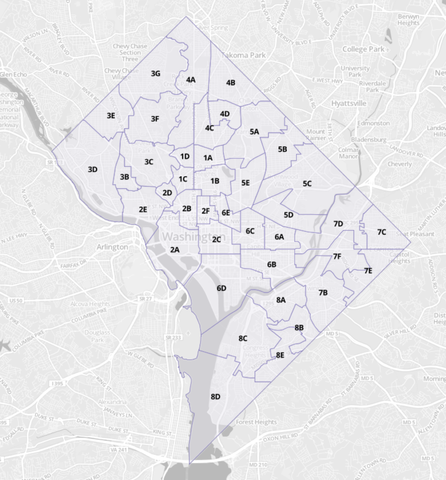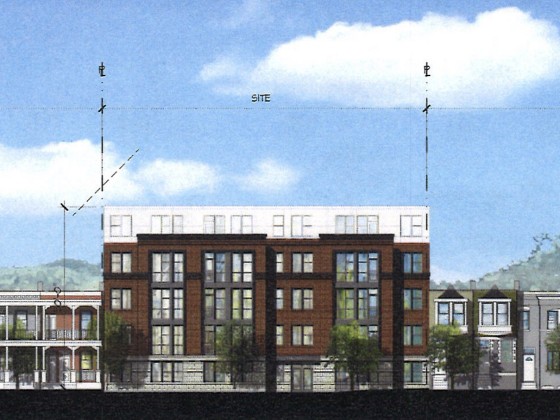 DC Council Considers Bill Exempting ANCs From FOIA Mandates
DC Council Considers Bill Exempting ANCs From FOIA Mandates

Advisory Neighborhood Commissions (ANC) are DC’s neighborhood-level government bodies, wherein elected representatives volunteer their time to review and issue recommendations on various initiatives that affect their community. Everything from liquor licenses to zoning and economic development projects fall under the ANC’s purview,and they also provide another layer of accountability for city constituents. If you read UrbanTurf regularly, you know that we attend a lot of ANC meetings around the city.
As part of what was meant as a good-faith effort to make ANCs more efficient and empowered since their inception in 1975, the DC Council Committee on Housing and Community Development considered the Advisory Neighborhood Commissions Omnibus Amendment Act of 2016 yesterday. But as the bill’s second public hearing displayed, the bill still leaves more than a little to be desired when it comes to ensuring the aforementioned accountability.
The ANC Omnibus Act intends to clarify some of the language and terminology from the 1975 version, while also creating standards for when and how ANC duties should be performed. The bill emphasizes both the necessity that ANCs provide the public with more information further ahead of time, and DC agencies and project applicants are proactive and timely in their involvement with the ANC.
Of the witnesses who testified on Wednesday, most agreed with the goal of making it easier for citizens to run for ANC seats and strengthening the commission’s ability to ensure that their notices are given “great weight” by DC agencies. Others pointed out that some clauses in the bill, while in good faith, are either unrealistic or raise questions of impropriety, such as the requirement that ANCs inform applicants of their inclusion on agendas 14 days prior to public meetings and the idea to offer menial stipends to commissioners.
story continues below
loading...story continues above
However, one of the most contentious provisions of the bill includes the reclassification of ANCs from being considered agencies, and therefore exempt from Freedom of Information Act (FOIA) transparency mandates.
Executive director of the Office of ANCs Gottlieb Simon testified that FOIA requests had been few and far between until five years ago, when it eventually became necessary to standardize a response to commissioners who needed further direction after such solicitations. Simon has served as a de facto FOIA liaison in multiple instances, and one of the main reasons that the exemption was included in the bill is because the FOIA process can be burdensome for ANC commissioners, who serve voluntarily.
“Although it may be frustrating for ANCs to comply with FOIA, each are statutorily bound to maintain and make public all records generated in the course of their duties as elected officials,” Traci Hughes, director of the Office of Open Government testified. “The law is unwavering on this point.” Hughes offered as a solution the creation of a centralized ANC portal that will serve as a one-stop shop for all agendas, minutes, documents, audio-visual files and other administrative records associated with each ANC meeting.
The measure to purportedly protect the ANC bureaucracy from the rigorous work required to respond to FOIAs echoes the recent DC Court of Appeals decision siding with Friends of McMillan in forcing the DC Council to release pertinent documents on the McMillan Sand Filtration site redevelopment.
The Council will revisit the bill after the summer recess.
See other articles related to: anc
This article originally published at https://dc.urbanturf.com/articles/blog/dc_elected_officials_foia_duties_again_on_the_table_with_proposed_anc_bill/11437.
Most Popular... This Week • Last 30 Days • Ever

DC's homebuyer assistance programs can be a bit complex. This edition of First-Timer ... read »

In this article, UrbanTurf looks at the estimated annual maintenance costs associated... read »

Plans for the development at a prominent DC intersection began nearly eight years ago... read »

Today, UrbanTurf is examining one of our favorite metrics regarding competition in th... read »

The residential development in the works along Florida Avenue NE is looking to increa... read »
- First-Timer Primer: DC's Home Buyer Assistance Programs
- What Are the Annual Maintenance Costs When You Own a Home?
- 388-Unit Development At Site of North Capitol Street Exxon Nears Completion
- The 6 Places In The DC Area Where You Aren't The Only One Bidding On a Home
- 46 to 48: The Biggest Project In Trinidad Looks To Get Bigger
DC Real Estate Guides
Short guides to navigating the DC-area real estate market
We've collected all our helpful guides for buying, selling and renting in and around Washington, DC in one place. Start browsing below!
First-Timer Primers
Intro guides for first-time home buyers
Unique Spaces
Awesome and unusual real estate from across the DC Metro














